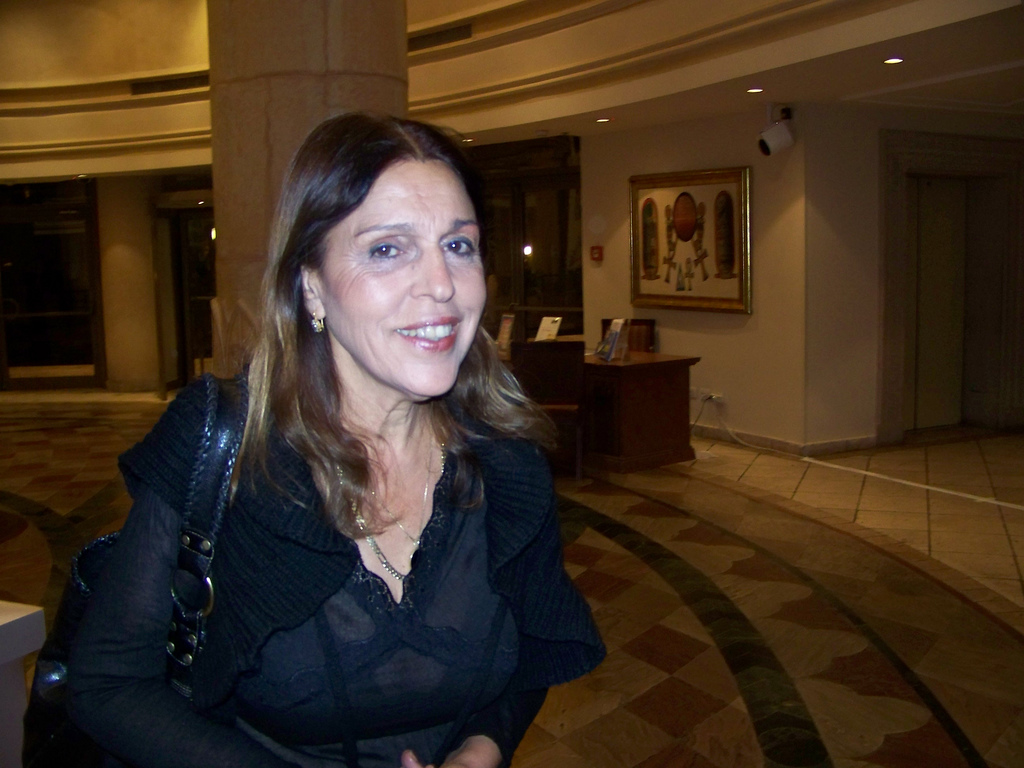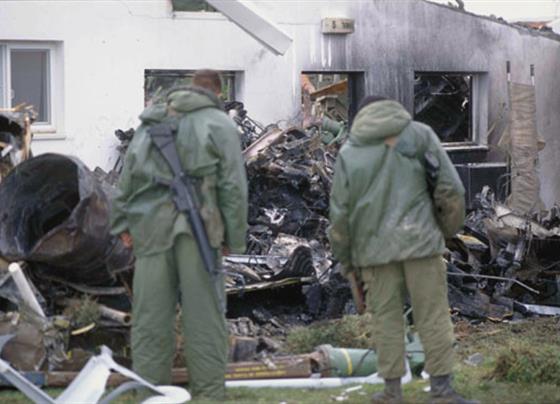|
Shelly Yachimovich
Shelly Rachel Yachimovich ( he, שלי רחל יחימוביץ׳, born 28 March 1960) is an Israeli politician, who served three terms as the official Leader of the Opposition, a member of the Knesset, and a member of the Foreign Affairs and Defense Committee. She served as leader of the Israeli Labor Party between 2011 and 2013. Before entering politics, she was a journalist, an author, and a television and radio commentator. Early life Yachimovich was born in Kfar Saba. Her father, Moshe, was a construction worker and her mother, Hanna, a teacher. Both parents were Holocaust survivors who immigrated to Israel from Poland. She became politically engaged at an early age, and was expelled from Ostrovsky high school in Ra'anana at age 15 for hanging up posters denouncing the principal's style of leadership. She was conscripted in 1978, and in 1985, Yachimovich graduated from Ben-Gurion University of the Negev with a degree in behavioural science. Journalism and media career While ... [...More Info...] [...Related Items...] OR: [Wikipedia] [Google] [Baidu] |
Kfar Saba
Kfar Saba ( he, כְּפַר סָבָא), officially Kefar Sava, is a city in the Sharon region, of the Central District of Israel. In 2019 it had a population of 110,456, making it the 16th-largest city in Israel. The population of Kfar Saba is nearly entirely Jewish. History of modern Kfar Saba The Palestinian village of Kafr Saba was considered to be ancient Capharsaba – an important settlement during the Second Temple period in ancient Judea,The Origin of the Name Capharsaba Kfar Sava Municipal Council is mentioned for the first time in the writings of , in his account of the attempt of |
Ben-Gurion University Of The Negev
Ben-Gurion University of the Negev (BGU) ( he, אוניברסיטת בן-גוריון בנגב, ''Universitat Ben-Guriyon baNegev'') is a public research university in Beersheba, Israel. Ben-Gurion University of the Negev has five campuses: the Marcus Family Campus, Beer Sheva; the David Bergmann Campus, Beer Sheva; the David Tuviyahu Campus, Beer Sheva; the Sede Boqer Campus, and Eilat Campus. Ben-Gurion University has about 20,000 students. Some of its research institutes include the National Institute for Biotechnology in the Negev, the Ilse Katz Institute for Nanoscale Science and Technology, the Jacob Blaustein Institutes for Desert Research with the Albert Katz International School for Desert Studies, and the Ben-Gurion Research Institute for the Study of Israel and Zionism. History Ben-Gurion University was established in 1969 as the University of the Negev with the aim of promoting the development of the Negev desert that comprises more than sixty percent of Israel. Th ... [...More Info...] [...Related Items...] OR: [Wikipedia] [Google] [Baidu] |
Ehud Barak
Ehud Barak ( he-a, אֵהוּד בָּרָק, Ehud_barak.ogg, link=yes, born Ehud Brog; 12 February 1942) is an Israeli general and politician who served as the tenth prime minister from 1999 to 2001. He was leader of the Labor Party until January 2011. He previously held the posts of defense minister and deputy prime minister under Ehud Olmert and then in Benjamin Netanyahu's second government from 2007 to 2013. He attempted a political comeback, running in the September 2019 Israeli legislative election as the leader of a new party that he formed. His party merged with other parties to form an alliance called the Democratic Union, but the alliance did not win enough seats for him to become a member of the Knesset. A lieutenant general in the Israel Defense Forces (IDF), Barak shares with two others the honor of being the most highly decorated soldier in Israel's history, having taken part in many battles and combat missions. He was appointed Chief of General Staff in 1991 ... [...More Info...] [...Related Items...] OR: [Wikipedia] [Google] [Baidu] |
Grass-roots Movement
Grassroots democracy is a tendency towards designing political processes that shift as much decision-making authority as practical to the organization's lowest geographic or social level of organization. Grassroots organizations can have a variety of structures; depending on the type of organization and what the members want. These can be non-structured and non-hierarchical organizations that are run by all members, or by whichever member wishes to do something. To cite a specific hypothetical example, a national grassroots organization would place as much decision-making power as possible in the hands of local chapters or common members instead of the head office. The principle is that for democratic power to be best exercised it must be vested in a local community and common members and instead of isolated, atomized individuals, at the top of the organization. Grassroots organizations can inhabit participatory systems. Grassroots systems differ from representative Repre ... [...More Info...] [...Related Items...] OR: [Wikipedia] [Google] [Baidu] |
Carmela Menashe
Carmela Menashe ( he, כרמלה מנשה, born 1949) is an Israeli journalist serving as a military reporter on IDF issues, on Israel's public radio Kol Yisrael. Biography Carmela Menashe is the daughter of Iraqi Jewish immigrants. She holds a master's degree in History of the Jewish People from Tel Aviv University. She served in the Paratroopers Brigade (IDF), IDF Paratroopers Brigade. She has one daughter, Ella, whom she raised as a single mother. Besides her journalism career, she is known as a champion of IDF soldiers and their families, aiding those who have been harassed or neglected within the IDF IDF or idf may refer to: Defence forces * Irish Defence Forces * Israel Defense Forces *Iceland Defense Force, of the US Armed Forces, 1951-2006 * Indian Defence Force, a part-time force, 1917 Organizations * Israeli Diving Federation * Interac .... Journalism career In 1974, Menashe started working at Kol Yisrael as a secretary. After graduating from a correspondents cours ... [...More Info...] [...Related Items...] OR: [Wikipedia] [Google] [Baidu] |
1997 Israeli Helicopter Disaster
The 1997 Israeli helicopter disaster ( he, אסון המסוקים: ''Ason HaMasokim'', lit. ''Disaster of the Helicopters'') occurred on February 4, 1997, when two Israeli Air Force transport helicopters ferrying Israeli soldiers into Israel's security zone in southern Lebanon collided in mid-air, killing all 73 Israeli military personnel on board. The crash brought about widespread national mourning and is considered a leading factor in Israel's decision to withdraw from southern Lebanon in 2000. Background Following the 1982 Lebanon War, Israel had withdrawn to a "security zone" in southern Lebanon, where it faced an insurgency by Hezbollah and other Lebanese groups. Israel had originally moved troops by ground, but this policy was changed as the threat of roadside bombs increased. As a result, Israel increasingly began ferrying soldiers by air into southern Lebanon. The crash Two Sikorsky S-65C-3 Yas'ur 2000 helicopters, ''357'' and ''903'', were assigned on a mission ... [...More Info...] [...Related Items...] OR: [Wikipedia] [Google] [Baidu] |
Israeli Withdrawal
Israeli may refer to: * Something of, from, or related to the State of Israel * Israelis, citizens or permanent residents of the State of Israel * Modern Hebrew, a language * ''Israeli'' (newspaper), published from 2006 to 2008 * Guni Israeli (born 1984), Israeli basketball player See also * Israelites, the ancient people of the Land of Israel * List of Israelis Israelis ( he, ישראלים ''Yiśraʾelim'') are the citizens or permanent residents of the State of Israel, a multiethnic state populated by people of different ethnic backgrounds. The largest ethnic groups in Israel are Jews (75%), foll ... {{disambiguation Language and nationality disambiguation pages ... [...More Info...] [...Related Items...] OR: [Wikipedia] [Google] [Baidu] |
Advocacy Group
Advocacy groups, also known as interest groups, special interest groups, lobbying groups or pressure groups use various forms of advocacy in order to influence public opinion and ultimately policy. They play an important role in the development of political and social systems. Motives for action may be based on Politics, political, religious, morality, moral, or commerce, commercial positions. Groups Methods used by advocacy groups, use varied methods to try to achieve their aims, including lobbying, media campaigns, consciousness raising, awareness raising publicity stunts, Opinion poll, polls, research, and policy briefings. Some groups are supported or backed by powerful business or political interests and exert considerable influence on the political process, while others have few or no such resources. Some have developed into important social, political institutions or social movements. Some powerful advocacy groups have been accused of manipulating the democratic syste ... [...More Info...] [...Related Items...] OR: [Wikipedia] [Google] [Baidu] |
Israel Army Radio
Army Radio ( he, גלי צה"ל lit. IDF waves) or Galei Tzahal, known in Israel by its acronym Galatz ( he, גל"צ), is a nationwide Israeli radio network operated by the Israel Defense Forces. The station broadcasts news, music, traffic reports and educational programs to the general public as well as entertainment and military news magazines for soldiers."It was good radio" Michael Handelzalts, October 21, 2010, Haaretz The network has one main station and an offshoot - '''' (Hebrew: גלגל"צ) - that broadcasts (mainly [...More Info...] [...Related Items...] OR: [Wikipedia] [Google] [Baidu] |
Channel 2 (Israel)
Channel 2 ( he, ערוץ שתיים, Arutz Shtaim), also called "The Second Channel" ( he, הערוץ השני, HaArutz HaSheni) was an Israeli commercial television channel. It started doing experimental broadcasts funded by the television tax. The channel started commercial broadcasting on 4 November 1993 regulated and managed by The Second Authority for Television and Radio. In its first years, the channel was operated by three broadcasters (" Keshet", "Reshet", and "Telad"), and in 2005 only two broadcasters were left while "Telad" stopped broadcasting due to its loss in the Second Authority's auction. On 31 October 2017, 24 years after the Channel started broadcasting, it got closed and split into two new channels: Keshet 12 and Reshet 13. The News Company that was founded alongside the Channel continued to broadcast news to both of the channels in parallel despite the split, but a few months after, after a merge between Reshet 13 and Arutz 10 channel, Reshet adopted Arutz ... [...More Info...] [...Related Items...] OR: [Wikipedia] [Google] [Baidu] |
Reshet Bet
''Kol Yisrael'' or ''Kol Israel'' ( lit. "Voice of Israel", also "Israel Radio") is Israel's public domestic and international radio service. It operated as a division of the Israel Broadcasting Service from 1951 to 1965, the Israel Broadcasting Authority from 1965 to 2017, and is currently administered by the Israeli Broadcasting Corporation. History ''Kol Yisrael'' was originally an underground Haganah radio station that broadcast from Tel Aviv. It started consistently broadcasting in December 1947 under the name ''Telem-Shamir-Boaz'', and was renamed to ''Kol HaHagana'' ("Voice of the Haganah") in March 1948. With Israel's declaration of independence on May 14, 1948, it was transformed into the official station ''Kol Yisrael''. Another station named ''Kol Yisrael'' operated in Haifa, and was renamed ''Kol Tzva HaHagana'' ("Voice of the Defense Force"). The first ''Kol Yisrael'' transmission was a live broadcast from Tel Aviv of David Ben-Gurion reading of the declaration of ... [...More Info...] [...Related Items...] OR: [Wikipedia] [Google] [Baidu] |
Israel Broadcasting Authority
The Israel Broadcasting Authority (IBA; ) was Israel's public broadcaster from 1948 to 2017. History The Israel Broadcasting Authority was an outgrowth of the radio station ''Kol Yisrael'', which made its first broadcast as an independent station on 14 March 1948. The name of the organization operating ''Kol Yisrael'' was changed to ''Israel Broadcasting Service'' in 1951. The law creating the ''Israel Broadcasting Authority'' was passed by the Knesset on 6 June 1965. Television broadcasts commenced on 2 May 1968, with color television following on 23 February 1983, although occasional color transmissions, of such events as the Eurovision Song Contest 1979 and the visit of the Egyptian President Anwar Sadat in 1977, had been made earlier. IBA operated two television channels and eight radio stations. In 1990, the Israeli parliament passed a law that resulted in the creation of the Second Israeli Broadcasting Authority, whose function was to enable and regulate commercial tel ... [...More Info...] [...Related Items...] OR: [Wikipedia] [Google] [Baidu] |






